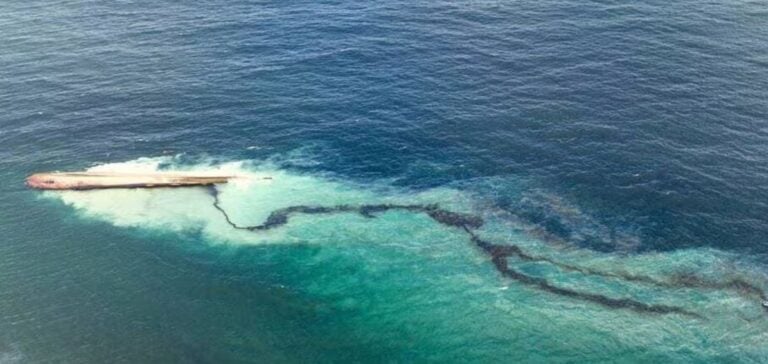The wreck of the Gulfstream tanker, responsible for a spill of 50,000 barrels of fuel oil off the coast of Trinidad and Tobago last February, continues to raise major safety issues. After being refloated and towed to Sea Lots, a port area in Port of Spain, the site is under increased surveillance by local security forces.
Recently, intruders attempted to enter the site, prompting an armed response from the coastguard.
A member of the response team was injured, although his life is not in danger.
The identity of the Gulfstream’s owners and the precise circumstances of its sinking remain unknown.
The vessel, carrying 85,000 barrels of fuel oil, capsized without alerting the authorities, plunging the country into an environmental and logistical crisis.
Since then, Trinidadian authorities have launched appeals to Tanzania, Nigeria, Panama, Aruba and Curacao to locate those responsible for the vessel and the tug Solo Creed, which was involved in the incident.
Complex security operations
The Gulfstream’s current location in Sea Lots, an area characterized by high crime rates, poses additional challenges for the authorities.
The Department of Energy, in collaboration with the Department of Homeland Security, has deployed considerable resources to secure the wreckage, while maintaining vigilance against surrounding illegal activity.
The recent intervention, marked by exchanges of fire, underlines the growing tensions around the site and the need to maintain reinforced security.
The costs associated with clean-up and surveillance operations are estimated at $30 million, a significant financial burden for Trinidad and Tobago.
This amount includes not only the clean-up efforts, but also the security measures deployed to protect the wreck and prevent further intrusions from compromising the ongoing investigation.
International survey in progress
The lack of identified owners and the circumstances surrounding the disappearance of the Gulfstream crew continue to complicate the investigation.
Faced with a lack of precise information, the Trinidadian authorities have stepped up international cooperation to shed light on the case.
However, despite diplomatic efforts, little progress has been made to date.
The decision to tow the wreck to Sea Lots was dictated by logistical considerations, despite the area’s reputation as a “hot spot” for illegal traffic.
This decision has raised concerns about the safety of the wreck, now located in an area where criminal activity is particularly prevalent.
The complexity of the situation calls for rigorous management of security operations, with a view to preserving the integrity of the site for the purposes of the investigation.
Developments in this case continue to be closely monitored by the Trinidadian authorities, who must juggle security imperatives with the demands of a complex international investigation.
The Gulfstream, with its persistent mystery, represents a major challenge for Trinidad and Tobago, both in terms of security and economics.






















